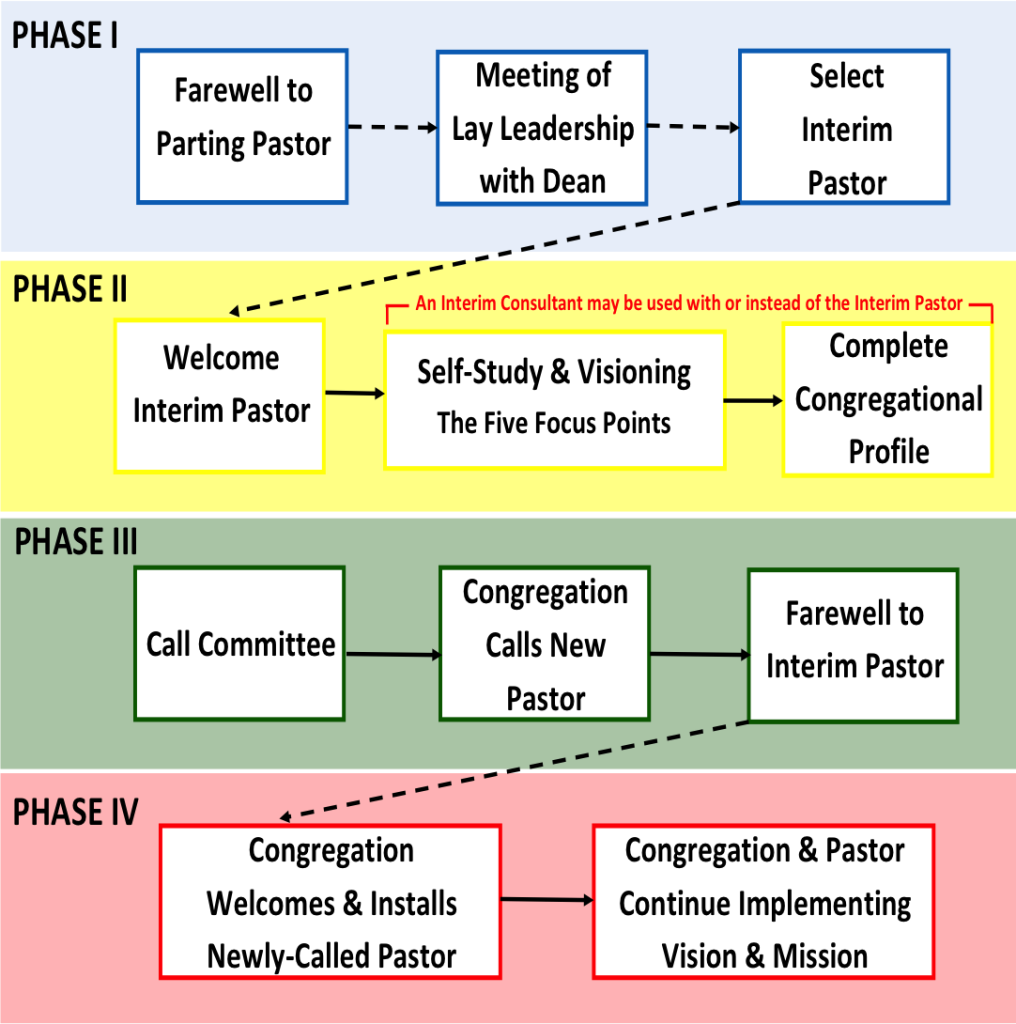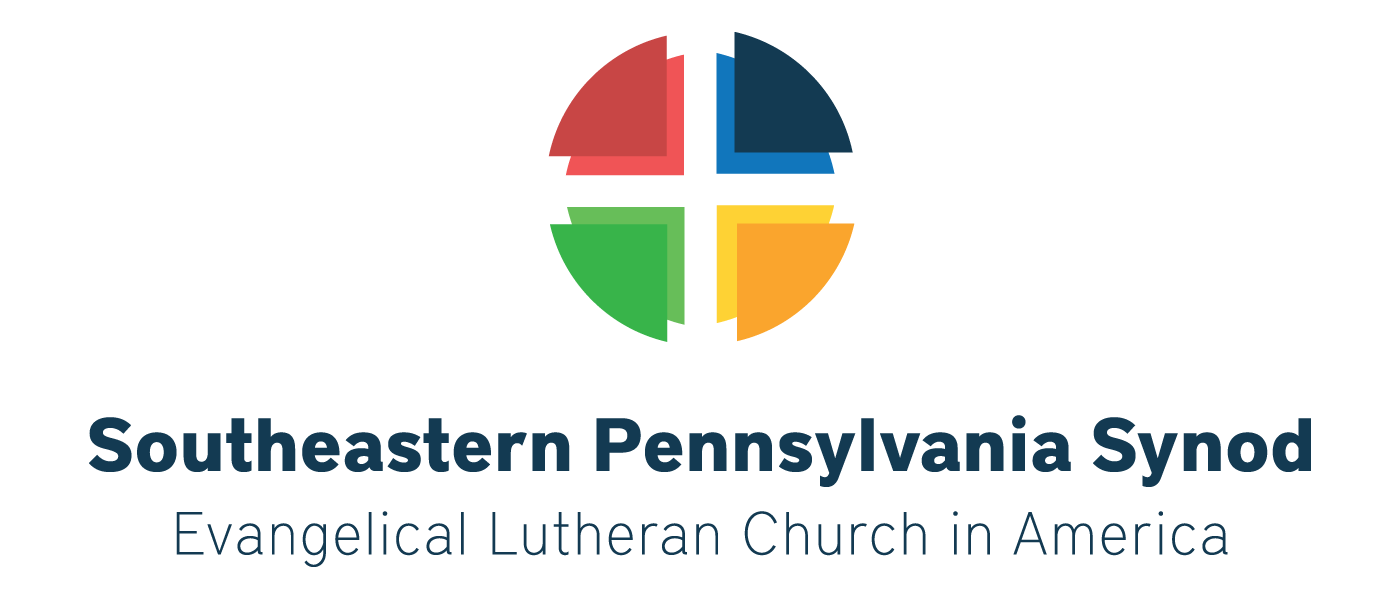Call Process
When your congregation’s regularly called pastor leaves, it enters into the “interim period” – a time for saying goodbye, reflecting on your faith community’s past and discerning God’s purpose for future ministry, and calling a new spiritual leader to guide the congregation into this new season. This can be a very positive and productive time for your congregation.
A congregation whose pastor is leaving is not alone. The Synod has resources to help your congregation journey through a carefully-designed interim process with a specially-trained intentional interim pastor, and using tools and approaches based on current research and the best methods available.
Resources for Lay Leaders
The Synod has developed a comprehensive guide to the Pastoral Transition Process. This guide should be made available to members of the Congregation Council to refer to throughout the process. This guide includes a detailed description of the process, sample communications, checklists, agreements and litanies to accompany leaders through the process.
- Pastoral Transition Guide for Lay Leaders (PDF)
- ELCA Call Process Resources (link)
- View additional documents (link)
- Compensation Manual (PDF)
- 2026 Compensation and Healthcare Recommendations (PDF)
*Update from SEPA Executive Committee
|
Pastoral Transition Process
The flow of the call process in our Synod includes four phases.
Phase I: After a Pastor Resigns or Retires
Phase One of the interim process begins when a pastor resigns or departs for any reason. As a pastor leaves, it is important to find a way to say goodbye and to begin to define appropriate boundaries so that the congregation is able to receive another individual as the pastor. If you are a congregation president or lay leader, Phase One describes the actions that should be taken by you in consultation with the Synod’s Office of the Bishop in order to begin the process of selecting your next pastor. Phase One ends in the selection of a qualified Interim Pastor, as specified in the ELCA Model Constitution for Congregations (Section C9.06). In the SEPA Synod, we normally use a specially-trained pastor known as an Intentional Interim Pastor (hereafter referred to as Interim Pastor or Interim). However, other interim resources may be available, such as Consultants, and Bridge Pastors. They are all Transition Ministers.
Phase II: Self-Study and Visioning Process, Congregational Profile
Phase Two of the interim process begins with the welcoming of the Interim Pastor or Consultant. The Interim Pastor or Consultant will lead the work of interim ministry by following a widely- accepted process known as the Five Focus Points for a congregation in transition. The purpose of the focus points is to help the congregation conduct a study of itself and its situation, to develop a vision of the future mission to which God is calling this congregation, and to discern the type of pastor and the pastoral characteristics needed to lead the congregation to fulfill that vision. Phase Two concludes with the preparation of a package of material called the Congregational Profile, and its submission to and approval by the Synod’s Office of the Bishop.
Phase III: The Call Process
Phase Three of the interim process is the Call Process. The Call Process begins when the Congregational Profile has been approved by the Synod’s Office of the Bishop. At this point, the congregation selects a Call Committee. That Call Committee receives the names of possible pastoral candidates in a highly confidential process. After the Call Committee interviews pastoral candidate(s) and hears them preach, it eventually recommends one pastoral candidate to the Council. If the Council agrees, the Council calls a special congregational meeting; this is done in coordination with the Office of the Bishop which appoints a deputy to run the meeting. Normally, the pastoral candidate leads worship and preaches at a Sunday morning worship service, which is followed by the special congregational meeting as described in the congregation’s constitution. If the congregation decides to issue a call to the pastoral candidate, and the pastoral candidate accepts, then he or she becomes the next regularly-called pastor of the congregation.
Phase IV: Implementation with Next Pastor
Phase Four of the interim process is the final phase. Throughout the process the congregation has worked to develop its vision of the future to which God is calling it and has called the pastor it believes will lead it in pursuing this vision. Now the congregation welcomes this new pastor. This new partnership is celebrated with a formal installation service.
Rather than set aside the work of the transition process, it is important for the pastor and congregation to work on implementation together. The arrival of the next pastor is not a time when “things return to normal,” but is a continuing part of transition. Throughout the Synod and beyond there are resources for congregations as they continue to live into the future to which God is calling them.
- Get complete information in the Pastoral Transition/Call Process Guide (PDF)
For more information about the call process contact your conference dean.
Updated: June 15, 2019 RF


